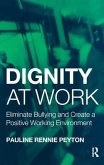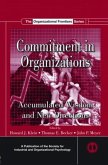Dignity and Inclusion at Work
Herausgeber: D'Cruz, Premilla; Caponecchia, Carlo; Noronha, Ernesto
Dignity and Inclusion at Work
Herausgeber: D'Cruz, Premilla; Caponecchia, Carlo; Noronha, Ernesto
- Gebundenes Buch
- Merkliste
- Auf die Merkliste
- Bewerten Bewerten
- Teilen
- Produkt teilen
- Produkterinnerung
- Produkterinnerung
The agenda of respectful workplaces is no more urgent than in the context of workplace bullying, emotional abuse and harassment. This becomes even more significant in the face of mistreatment linked to social identity and national culture. The chapters constituting Section 1 speak to the spectrum of primary, secondary and tertiary prevention undertaken within and beyond workplaces to tackle workplace bullying, emotional abuse and harassment. As well as organizational-related mechanisms, therapy, collective action and legislation are described. Normative angles, the challenges of actual…mehr
Andere Kunden interessierten sich auch für
![Rethinking Work Rethinking Work]() Rethinking Work183,99 €
Rethinking Work183,99 €![Dignity at Work Dignity at Work]() Pauline Rennie PeytonDignity at Work143,99 €
Pauline Rennie PeytonDignity at Work143,99 €![How to be Resilient in Your Career How to be Resilient in Your Career]() Helen OfosuHow to be Resilient in Your Career183,99 €
Helen OfosuHow to be Resilient in Your Career183,99 €![In Defense of Troublemakers In Defense of Troublemakers]() Charlan Jeanne NemethIn Defense of Troublemakers24,99 €
Charlan Jeanne NemethIn Defense of Troublemakers24,99 €![Building Sustainable Leadership from the Inside Building Sustainable Leadership from the Inside]() Joakim ErikssonBuilding Sustainable Leadership from the Inside194,99 €
Joakim ErikssonBuilding Sustainable Leadership from the Inside194,99 €![Process Matters Process Matters]() Joel BrocknerProcess Matters19,99 €
Joel BrocknerProcess Matters19,99 €![Commitment in Organizations Commitment in Organizations]() Commitment in Organizations206,99 €
Commitment in Organizations206,99 €-
-
-
The agenda of respectful workplaces is no more urgent than in the context of workplace bullying, emotional abuse and harassment. This becomes even more significant in the face of mistreatment linked to social identity and national culture. The chapters constituting Section 1 speak to the spectrum of primary, secondary and tertiary prevention undertaken within and beyond workplaces to tackle workplace bullying, emotional abuse and harassment. As well as organizational-related mechanisms, therapy, collective action and legislation are described. Normative angles, the challenges of actual practice and the contours of effectiveness are pinpointed. The increasing recognition of the conflation between category-based harassment and workplace bullying and the burgeoning cross-cultural lens of the substantive area are captured through the chapters of Section 2. Identities revolving around gender, sexuality, disability, caste and ethnicity serve as markers for mistreatment, underpinning the needto explore the dynamics of these situations in terms of causes, manifestations and consequences. Variations in the unfolding of negative acts due to cultural influences have been found, emphasizing that though misbehaviour is universal, it has country-specific characteristics.
Hinweis: Dieser Artikel kann nur an eine deutsche Lieferadresse ausgeliefert werden.
Hinweis: Dieser Artikel kann nur an eine deutsche Lieferadresse ausgeliefert werden.
Produktdetails
- Produktdetails
- Handbooks of Workplace Bullyin Nr.3
- Verlag: Springer London / Springer Singapore
- 2021
- Seitenzahl: 546
- Erscheinungstermin: 5. Februar 2021
- Englisch
- ISBN-13: 9789811302190
- ISBN-10: 9811302197
- Artikelnr.: 52441201
- Herstellerkennzeichnung
- Libri GmbH
- Europaallee 1
- 36244 Bad Hersfeld
- gpsr@libri.de
- Handbooks of Workplace Bullyin Nr.3
- Verlag: Springer London / Springer Singapore
- 2021
- Seitenzahl: 546
- Erscheinungstermin: 5. Februar 2021
- Englisch
- ISBN-13: 9789811302190
- ISBN-10: 9811302197
- Artikelnr.: 52441201
- Herstellerkennzeichnung
- Libri GmbH
- Europaallee 1
- 36244 Bad Hersfeld
- gpsr@libri.de
Premilla D'Cruz holds a Ph.D. in Social Sciences from the Tata Institute of Social Sciences, Mumbai, India. She is currently Professor of Organizational Behaviour at the Indian Institute of Management Ahmedabad, India. Together with Ernesto Noronha, Premilla has been researching the area of workplace bullying for over a decade and has covered various facets of the phenomenon through pioneering work which has extended the boundaries of our understanding. In addition to two authored books on workplace bullying (Workplace Bullying in India [Routledge] and Depersonalized Bullying at Work [Springer]), Premilla has recently co-edited both a special issue of Qualitative Research in Organizations and Management (Emerald) on workplace bullying and a book titled Indian Perspectives on Workplace Bullying: A Decade of Insights (Springer). She has published numerous papers in reputed peer-reviewed journals, such as Journal of Business Ethics, Information and Organization, Economic and Industrial Democracy and International Journal of Human Resource Management, and made several international presentations on the topic. Premilla's other research interests include emotions at work, self and identity at work, organizational control, and information and communication technologies (ICTs) and organizations. Premilla has been a visiting scholar at various European and Australian universities and has received multilateral and bilateral study grants, in addition to several awards for outstanding academic and research work throughout her student and professional career. She has been President of the International Association on Workplace Bullying and Harassment (IAWBH) between 2016 and 2018, having earlier served as Secretary (2010-2016) and Special Interest Groups Coordinator (2008-2010). She is currently the section editor of Labour Relations and Business Ethics at the Journal of Business Ethics. More details about Premilla's work are available at https://www.iima.ac.in/ web/faculty/faculty-profiles/premilla-d-cruz. Ernesto Noronha holds a Ph.D. in Social Sciences from the Tata Institute of Social Sciences, Mumbai, India. He is currently Professor of Organizational Behaviour at the Indian Institute of Management Ahmedabad, India. Together with Premilla D'Cruz, Ernesto has been involved in pioneering studies on various aspects of workplace bullying and has several published papers and presentations in the substantive area. Ernesto's other research interests include workplace ethnicity, technology and work, and labour and globalization, and he has numerous papers published in reputed peer-reviewed journals on these topics, including Journal of Business Ethics, Industrial and Labor Relations Review, Information and Organization and Journal of Contemporary Asia. He has recently co-edited Critical Perspectives on Work and Employment in Globalizing India (Springer). Ernesto has received bilateral and multilateral grants to study various aspects of employee experiences of work in India's offshoring and outsourcing sector, focusing on new and unexplored areas such as organizational control, diversity, telework and collectivization, in addition to the VVEF Outstanding Researcher Award 2009 and 2017 at the Indian Institute of Management Ahmedabad. Ernesto has been a Visiting Professor at the Industrial and Labor Relations (ILR) School, Cornell University, and at the Institute for Sociology, University of Vienna. He has presented invited talks as a visiting scholar at numerous European universities, such as Strathclyde, Portsmouth, Bergen and Hamburg, in addition to the keynote address at the 2010 Work, Employment and Society (WES) conference. He is currently a board member of the RC30 Sociology of Work group at the International Sociological Association (ISA) and the section editor of Labour Relations and Business Ethics at the Journal of Business Ethics. More details about Ernesto's work are available at https://www.iima.ac.in/ web/faculty/faculty-profiles/ernesto-noronha. Carlo Caponecchia is Senior Lecturer at the University of New South Wales, Sydney, Australia. Carlo's research interests are in safety and human factors, and he has conducted projects across a range of industrial domains on psychosocial hazards at work, risk perception and human error. Carlo's work in psychosocial hazards has championed the use of risk management frameworks for the prevention and management of these sources of harm. His research has contributed to the conceptual clarification of workplace bullying and related behaviours, measurement and risk identification as well as intervention research. Carlo facilitates the translation of research to practice by providing training, evidence to court and government inquiries and advice to a wide range of stakeholders. Carlo is the current President of the International Association on Workplace Bullying and Harassment (IAWBH) and a member of the Standards Australia committee responsible for Occupational Health and Safety Management Systems standards. Jordi Escartín is currently Associate Professor of Organizational Behaviour at the University of Barcelona, Spain, and serves as Invited Professor and Executive Coach at ESADE Business School, Barcelona, Spain. He is also Associate Researcher at the Centre for Leadership and Behaviour in Organizations, Germany. Jordi's main lines of research concern workplace bullying and harassment, ethics, gender, leadership and positive organizational psychology. He has published in several journals, such as Journal of Business Ethics, Work and Stress and International Journal of Human Resource Management, and, among others, has authored Mobbing. Acoso Psicológico en el Trabajo (2012, Ed. Síntesis). As a systemic coach and organizational consultant, Jordi actively advises companies in America, Asia and Europe. His more extensive consultancies involve the development of protocols for the prevention of and action against workplace bullying, the analysis and reports of workplace bullying complaints and the training of competencies for the diagnosis of and interventions against workplace bullying. Denise Salin is Professor of Management and Organization at the Hanken School of Economics, Helsinki, Finland. Her research centres mostly around the dark side of organizational behaviour. Her research interests include antecedents and outcomes of workplace bullying and mistreatment, and she has been doing research in this field since the late 1990s. Denise is currently responsible for the Academy of Finland project "Preventing workplace bullying and mitigating its consequences: The role of human resource practices" (308843). She has also conducted research on gender and leadership and on workplace bullying as a gendered phenomenon. Denise's work has been published in Human Relations, International Journal of Human Resource Management, European Journal of Work and Organizational Psychology,Work and Stress and Gender, Work and Organization, among other journals. She is also affiliated with the University of Bergen, Norway, where she is involved in the project "Workplace bullying: From mechanisms and moderators to problem treatment" (250127). Michelle Rae Tuckey is Associate Professor of Psychology at the University of South Australia, Adelaide, Australia. Her programme of research on well-being at work focuses on understanding the mechanisms involved in workplace bullying and occupational stress. Michelle is working to advance the risk management of bullying as a work health and safety hazard and develop practical evidence-based tools for sustainable bullying prevention. Her other research interests relate to psychosocial safety climate, leadership and mental health and mindfulness at work. Michelle serves on the editorial boards and as guest editor for the Journal of Occupational Health Psychology and International Journal of Stress Management. She is also on the board of Brodie's Law Foundation. Michelle has published over 80 scholarly journal articles, edited books, book chapters and research reports, and her research has been translated into policies and practices to prevent bullying and stress in organizations.
Risk management and bullying as a workplace health and safety (WHS) hazard.
Work and organisational design: Influence on workplace bullying.
Workplace bullying policies: A review of best practices and research on effectiveness.
Addressing workplace bullying: the role of training.
Managing workplace bullying complaints: Conceptual influences and the effects of contextual factors.
Complaint investigation in cases of workplace bullying, emotional abuse and harassment.
Mediating Workplace Bullying and Harassment Complaints: A Risk Management Perspective.
Regulation as intervention: How regulatory design can affect practices and behaviours in the workplace.
Diagnosis and treatment: Repairing injuries caused by workplace bullying.
Strengthening the evidence
case of workplace bullying interventions through implementation research: Taking interventions to scale.
Bullies, Managers, Workers, and Trade Unionists.
Workplace bullying and gender: an overview of empirical findings.
Sexual orientation and workplace bullying.
Ethnicity and workplace bullying.
Workplace bullying, disability and chronic ill
health.
Religious harassment and bullying in the workplace.
Age.
Caste and the workplace: Propensity to bully, harass and discriminate.
Culture and workplace bullying: an overview.
Work and organisational design: Influence on workplace bullying.
Workplace bullying policies: A review of best practices and research on effectiveness.
Addressing workplace bullying: the role of training.
Managing workplace bullying complaints: Conceptual influences and the effects of contextual factors.
Complaint investigation in cases of workplace bullying, emotional abuse and harassment.
Mediating Workplace Bullying and Harassment Complaints: A Risk Management Perspective.
Regulation as intervention: How regulatory design can affect practices and behaviours in the workplace.
Diagnosis and treatment: Repairing injuries caused by workplace bullying.
Strengthening the evidence
case of workplace bullying interventions through implementation research: Taking interventions to scale.
Bullies, Managers, Workers, and Trade Unionists.
Workplace bullying and gender: an overview of empirical findings.
Sexual orientation and workplace bullying.
Ethnicity and workplace bullying.
Workplace bullying, disability and chronic ill
health.
Religious harassment and bullying in the workplace.
Age.
Caste and the workplace: Propensity to bully, harass and discriminate.
Culture and workplace bullying: an overview.
Risk management and bullying as a workplace health and safety (WHS) hazard.
Work and organisational design: Influence on workplace bullying.
Workplace bullying policies: A review of best practices and research on effectiveness.
Addressing workplace bullying: the role of training.
Managing workplace bullying complaints: Conceptual influences and the effects of contextual factors.
Complaint investigation in cases of workplace bullying, emotional abuse and harassment.
Mediating Workplace Bullying and Harassment Complaints: A Risk Management Perspective.
Regulation as intervention: How regulatory design can affect practices and behaviours in the workplace.
Diagnosis and treatment: Repairing injuries caused by workplace bullying.
Strengthening the evidence
case of workplace bullying interventions through implementation research: Taking interventions to scale.
Bullies, Managers, Workers, and Trade Unionists.
Workplace bullying and gender: an overview of empirical findings.
Sexual orientation and workplace bullying.
Ethnicity and workplace bullying.
Workplace bullying, disability and chronic ill
health.
Religious harassment and bullying in the workplace.
Age.
Caste and the workplace: Propensity to bully, harass and discriminate.
Culture and workplace bullying: an overview.
Work and organisational design: Influence on workplace bullying.
Workplace bullying policies: A review of best practices and research on effectiveness.
Addressing workplace bullying: the role of training.
Managing workplace bullying complaints: Conceptual influences and the effects of contextual factors.
Complaint investigation in cases of workplace bullying, emotional abuse and harassment.
Mediating Workplace Bullying and Harassment Complaints: A Risk Management Perspective.
Regulation as intervention: How regulatory design can affect practices and behaviours in the workplace.
Diagnosis and treatment: Repairing injuries caused by workplace bullying.
Strengthening the evidence
case of workplace bullying interventions through implementation research: Taking interventions to scale.
Bullies, Managers, Workers, and Trade Unionists.
Workplace bullying and gender: an overview of empirical findings.
Sexual orientation and workplace bullying.
Ethnicity and workplace bullying.
Workplace bullying, disability and chronic ill
health.
Religious harassment and bullying in the workplace.
Age.
Caste and the workplace: Propensity to bully, harass and discriminate.
Culture and workplace bullying: an overview.








